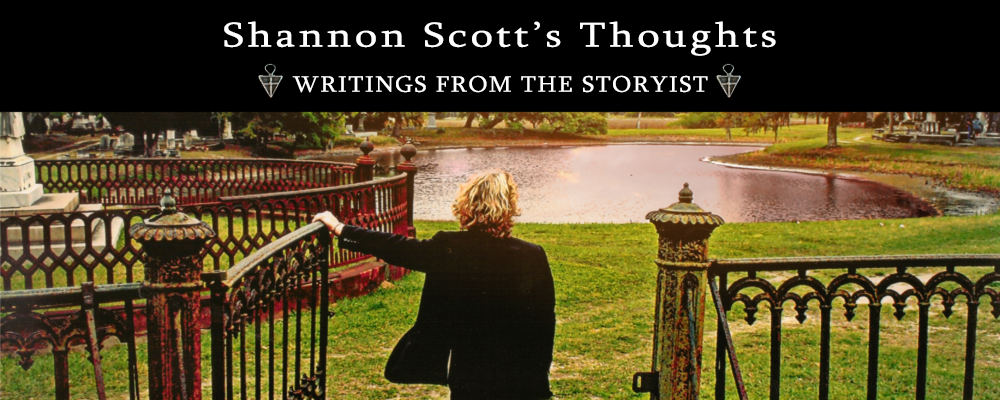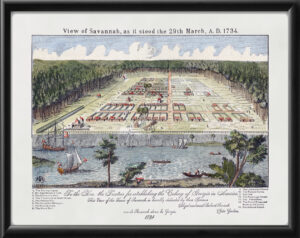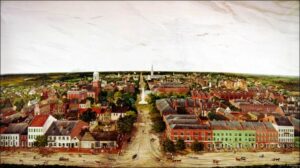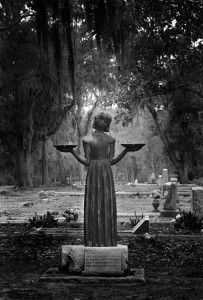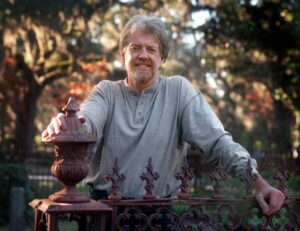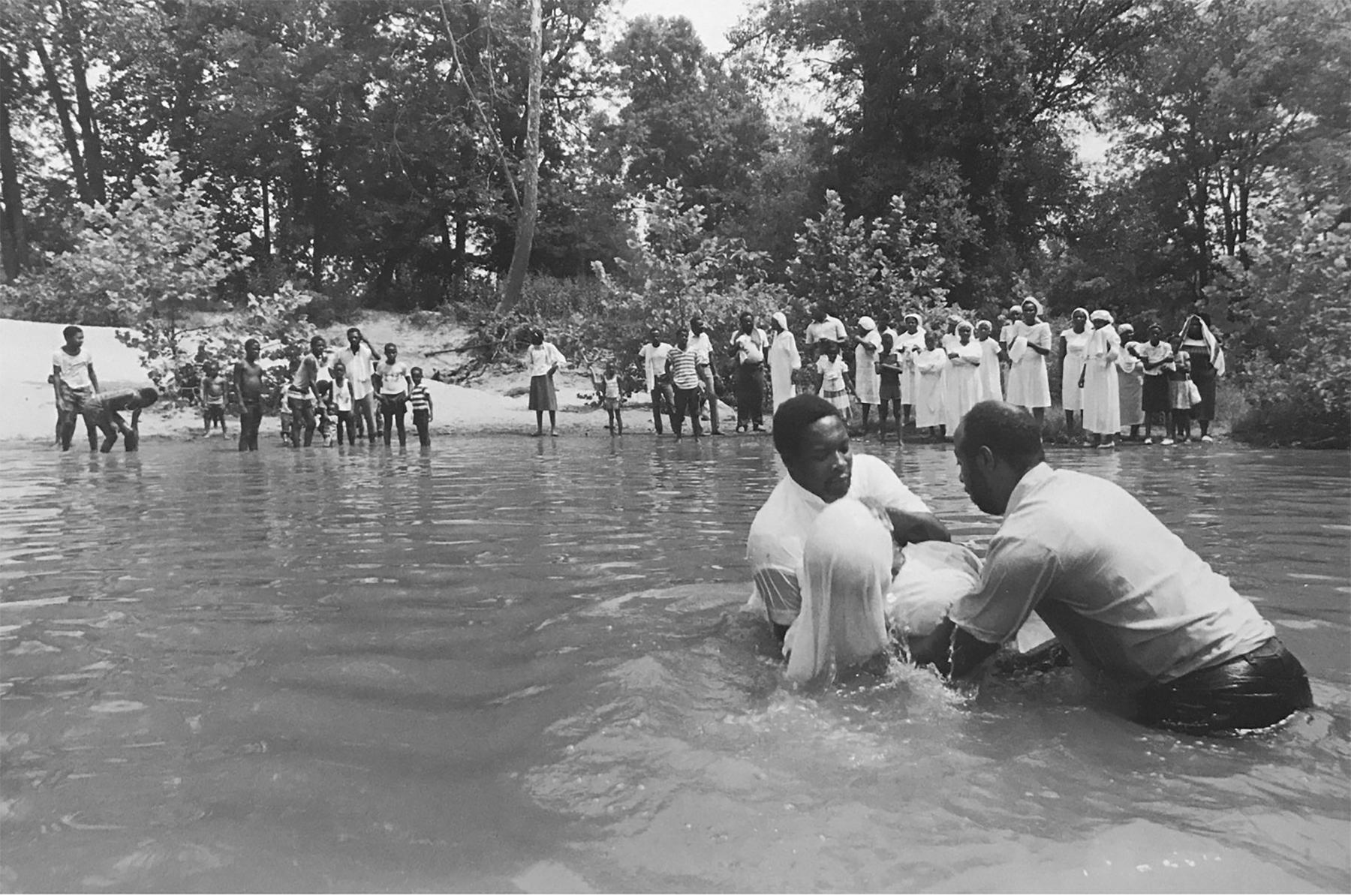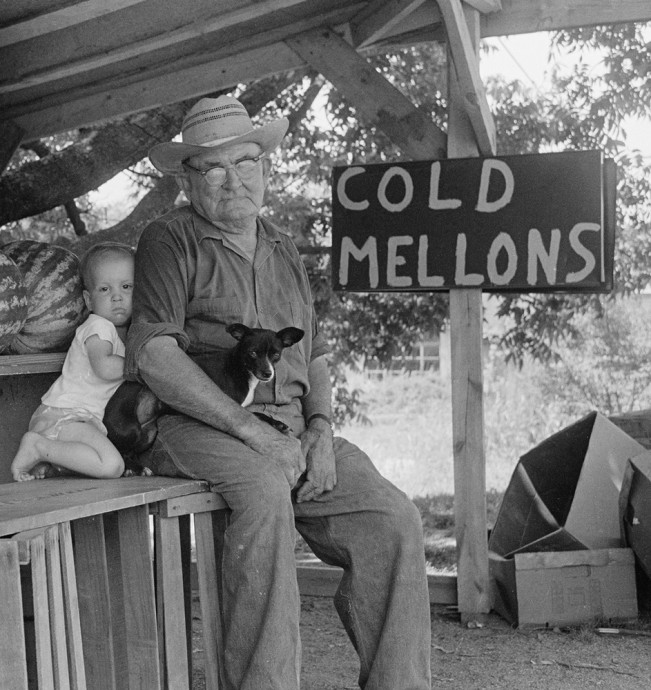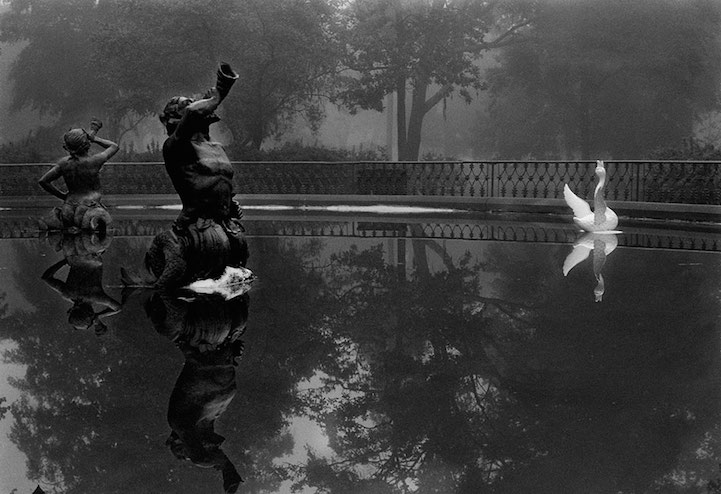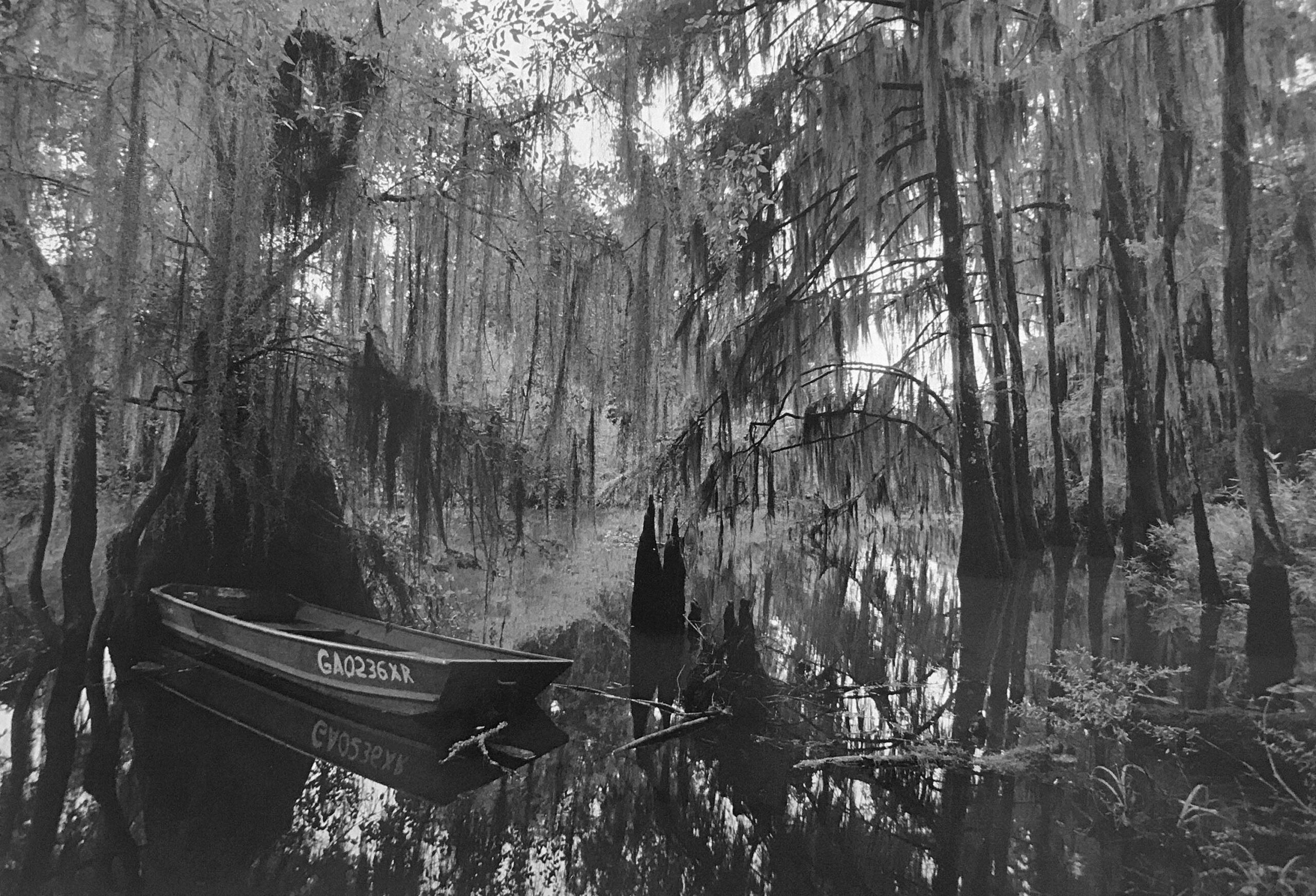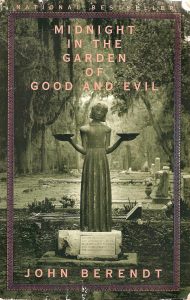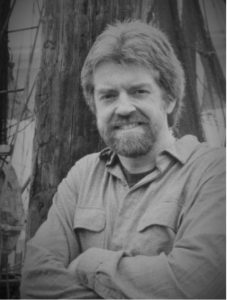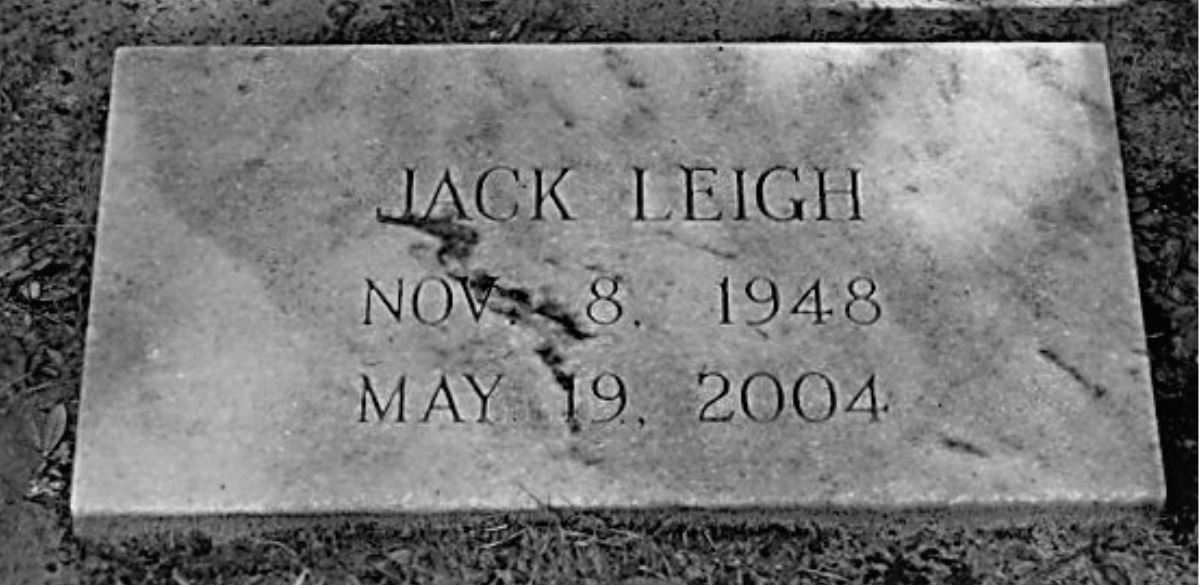Know this. There will forever be three images most associated with Savannah: Peter Gordon’s 1734 Birdseye View of Savannah, Joseph Cerveau’s 1837 town painting that is also a bird’s-eye view, and the most famous of them all, Jack Leigh’s 1993 aptly named “Bird Girl.”
– Shannon Scott
- Peter Gordon’s Birdseye View of Savannah, 1734
- Joseph Cerveau’s Savannah 1837
- Bird Girl by Jack Leigh 1993 (C) All Rights Reserved
- Jack Leigh smiling in Bonaventure Cemetery after winning 7 figure settlement over misuse of his Bird Girl by Universal.
For the better part of 14 years in downtown Savannah, I lived catty-corner to Clary’s Cafe in two neighboring buildings on the northwest corner of Jones & Abercorn Street. The initial life station for eight of those years was 124 East Jones St Apt 2 on the 3rd Floor. It was primo people-watching, day and night, and became my personal storyteller watch tower that better enabled me to see the town that so fascinated me from above-average height. It was like I’d go down into the commonwealth during the day for information gathering, then return to my observation tower at night to dwell on all that had happened below inside Savannah-world. This was still a town that a broke dreamer could come to, and it was the best $275 a month I ever spent and the type of story perspective that will never be known again in Savannah, Georgia. The next great Savannah yarns will only be written by well-to-do students, inheritors, self-made millionaires or a strapped bloke lucky enough to borrow a sofa or dwelling from one of the above mentioned. Or yes, God forbid, a travel writer here for a weekend.
And I wonder, is the era of Savannah’s great downtown characters just as dead or endangered? Probably the latter. Sure, the foreign invaders or the nouveau riche may become that in 50 years, but it won’t be the same. They “summer” or “winter” here and vacation rental it the rest of the time. Even I came in at a changing-of-the-guard hour as an art student and met the remaining vestiges of the old names in their old houses. Even those elders knew things were changing. They had certain forlorn looks in their eyes. They were kind of like me now in a way, I suppose, feeling sentimental to memories of those gone from their own early days and knowing there wasn’t much to be done but sigh and hope someone new or younger might care to hear of them. Thank goodness I had that, looking back. I feel certain Savannah would not have the same appeal to me today. Not that I would’ve known a difference as a student looking at moving to such a beautiful city. Part of me feels the new stock is lucky that way. They’ll never have the pain of knowing what they missed, really. Their measure will be just the esthetics of the place, the cool hip joints and their friends, and maybe they’ll stop to learn the history. But they won’t really meet the history. The dimension from which I speak is basically gone.
Before people rolled around on robotic devices, it used to be if you lived in downtown Savannah, you walked. And walked. And walked. And walked some more. Which to add, there’s a noteworthy distinction in that visitors and residents do it differently. For tourists, the streets and lanes are that: thoroughfares. For the more permanent spirits, especially “back in the day,” they were the hallways to the different rooms. Our respective houses or apartments were more like the part of the house we were all just hanging out in and(at times), the house didn’t seem to have too many walls. To drop in was just as ordinary to us as it was turning a corner in your own home and bumping into a family member. To us, the squares were like large, communal sun-rooms with mini forests and places for greater play in them. Which (don’t get me wrong), you don’t always want to see your own family, so Savannah-landia can make you a little crazy, too.
- Jack Leigh Photography (C) All Rights Reserved
- Jack Leigh Photography (C) All Rights Reserved
- Jack Leigh Photography (C) All Rights Reserved
- Jack Leigh Photography (C) All Rights Reserved
Alas, when Savannah was still creaking around the edges and crawling with native characters, one of them was my neighbor, renowned Southern photographer, Jack Leigh. His photography studio gallery and home were at the corner of Oglethorpe & Abercorn Street. The location left me a little envious, as it was the same kind of northwest corner dwelling as my own, but his home was catty-corner to Colonial Park Cemetery. Some people have all the luck. Oh, and let it be now forever said that highly creative people live on corners.
Jack’s house was a five-minute walk from my own. I could walk down from my apartment, turn left on Abercorn, head north, and in no time, pass by the white, angled, double set of doors of his street-level gallery. I first knew the space as Blatner’s Antiques, owned by another Savannah character, good friend and historian, Paul Blatner. Although I don’t know for a fact, if just because great time has passed, I presume the success of “Midnight in The Garden of Good and Evil” and “Bird Girl” garnered Jack his corner gallery life. But on any given day, you’d find Jack, or his daughters, or sidekick and curator, Susan Laney, hanging out in the gallery and, in more casual moments, the front porch. And if it not there, we were routinely passing on that stretch of Abercorn. Jack and I shared more conversations in that stretch of city than I can count. It still feels just like yesterday.
In some sense, I’m not here to tell you about Jack Leigh, the photographer, or how he was an absolute master of the black and white medium, or the many books that he published capturing the everyday lives of people and tradesman of The South. If there were no internet, maybe. A quick cursory search can satisfy all of that for you. There are plenty of people who have been far better friends or biographers of his works, like his former gallery director and assistant, Susan Laney. There are also his two daughters, who he loved immensely and took on many photographic adventures, that can tell you more about their father than I ever could. You may read his daughter Gracie’s touching comments here. Gracie’s Tribute Letter No, my purpose is to give you a glimpse of the Jack I remember and an estimate of the hours that I knew him. It may seem brief, but it is accurate, and the memory is deep.
He was a sage soul. Quiet & reserved. I don’t mean this negatively at all, but he was one of those creative people who lived more in his head, and although he paid the world great attention and was very good-natured, you could tell that when it came to earthly-plane relationships, he was merely taking a momentary break from playing 5th-dimensional chess somewhere else. I think some souls belong to that world of their own and Jack had earned it. So, it was hard in a sense to “know him.” He spoke words in a chuckle and understanding nod or well-meaning smile. I’m not sure if he was conscious of this part of himself or if that was just “him.” Me? I just talk a lot, by nature.
His ex-wife, photographer and my close friend, Susan Patrice, once humorously spoke in regard to Jack taking the famous photo for the dust jacket of Midnight in The Garden of Good and Evil. She told me that in 1992, Jack had been given nothing but the title of the book by Random House, and one pre-dawn morning, he went into Bonaventure Cemetery to look for something that suited. Maybe not even knowing he’d find it there. How fascinating that this one artist’s instinct would forever make Bonaventure “The Garden” and Savannah a worldwide household name. Jack later expressed to Susan that he’d laid eyes on the statue, then known as Little Wendy, in a family plot directly overlooking the river. That, in his eye, it was as if the statue was holding the whole of Bonaventure behind her and the fates of the souls simultaneous. This would be the beginning of his unconscious Botticelli moment. Little did Jack know his camera and later darkroom workings of creating moonlight in the image would give birth to The Venus of Savannah. But what made Susan laugh was that Jack casually expressed to her that he “courted the fog” in order to get his legacy shot. Hah! Only an artist could coin that one! Yes, perhaps in Jack’s quiet reserve, he could literally siphon such moments with the energy he didn’t spend speaking. And like the camera nature, he let the work speak for him. I’m not sure if Jack would give himself this credit, but in ways, he’d become the camera. Like a human utility for channeling the art that needed to be channeled. Some part of me believes Jack knew this and was consciously making or being this. But I doubt if he ever admitted it or would. Only but with a wink or coy smile. My guess is that he’d be happy for you if you just thought of it all that way. And so, I do.
Anyway, Jack always, always showed real appreciation for other artists and people doing their thing. He certainly spurred me along in my own. He was an art kid at heart. I rarely remember seeing him in anything but a black T-shirt or turtleneck, blue jeans and black shoes like some college kid in art school. Again, the camera had a look, and it was his camera man and picture-taking uniform. It’s interesting how you can’t find too many public photos of him, either. A lot of great photographers, even after death, seem to have succeeded in remaining personally anonymous. I’ve always admired that. Their art lives on in some form, and it’s like it stays even more spiritual. Jack was a good looking guy, too. But he wasn’t a self-portrait guy, right?
It’s been weird, following his death of colon cancer at 55, to have watched his prolific studio gallery go from a convenience store to a Thai take-out joint. I’m not even sure who lives above it to be frank. As Jack was dying of colon cancer, the theory being years of exposure to dark room chemicals, he went from his usual Irish-looking, ivory complexion to more of a jaundiced yellow. His ex wife Susan, would lovingly walk with him up and down Abercorn Street and around the block, supporting his ever-weakening frame, which is how I really learned of his illness. And seeing death on Jack’s face and body gob-smacked me square in the tear ducts. I cannot imagine how hard all of that was and am honestly not intimately familiar with the details of his last days, less to say, he was surrounded by lots of love. In our case, we were only passing in the halls of our Savannah home, as we’d done many times, but these would be the last of those moments. Of course, he was dying, and so the looks we all exchanged were what they were. A few words were said, Susan ever-reassuring, and Jack nodding like we need not say anything more.
It’s funny, Jack still seemed like the same old Jack. Not bothered by too much, even dying. I remember his body seemed gone, but his eyes were like two, firm telephoto lenses, un-corrupted, still staring out, taking it all in. His eyes also said to me, he didn’t want to leave the world, especially for his children. That was the most detectable sadness. I’m sure he left unfinished works, but that’s what pained him most. The silver-lining, I suppose, is that The Bird Girl became an angel to his girls and, my guess, set them up for life, financially, helping them through college and much more. Just a hopeful assumption, really. I only know of Susan and the girls from a distance, as they all relocated to Asheville, but I hear that everyone is doing well.
The memory of Jack evokes a big sigh from me as I sit here, for all of the obvious. But as a storyteller in Bonaventure? Jack sort of gave me a forever job. Crazy, right? Through his accomplishment, his passion, and his love for the world, he gave lots of people larger leases on life, and I will always owe him this personal debt. Bonaventure Cemetery was known before him, but how famous would it be now without his celebrated photo? The book it belonged to was decent, but the photo was what sold it all the way around, and everyone kind of knows that. It made Bonaventure famous in the way Jim Morrison made Pere Lachaise Cemetery in Paris famous. (I mean only so many people know who Jean Paul Sartre was, right?) So famous in fact, the old guard of our town took the statue of “Little Wendy” (aka: The Bird Girl) completely out of the cemetery! Which I still consider an art heist, by the way. #BringTheBirdGirlBack
They often say artist lives, or our lives, come full circle. Perhaps nothing says that more than Jack Leigh being buried in his family plot in Bonaventure and rather close to the front entrance itself, VIP style. By the appearance of his headstone sitting just below his father’s Beverly’s, to show the close relationship they had, I will assume that Jack was cremated. While visiting recently, I noticed that his grandmother on his mother’s side was, by maiden name, a Rehm. It’s not a name one comes across much, and I should know that, as it’s my mother’s maiden name. Wouldn’t it be something to think Jack and I were actually related? Hah! Nothing would make me happier, and I think it’s making Jack laugh right now. Maybe that’s why it took me years to actually tell his story on one of my tours. I’d never mourned Jack in the open, but one evening on my After-Hours tour, some 30 people saw me full-on lose it for a couple of minutes, and I braved through the words. I had to let go of it. I find that, curiously, I’ve mourned the loss of a member of our Savannah family, my surrogates, more than once on a tour. Just goes with the territory.
Jack would appreciate us thinking of him and me bringing him back to life a little here today. I’ll tell you something that I don’t always share with folks. The magic of Savannah is that even if you don’t know the local characters in depth, or you didn’t grow up with them, or you never sat at their dinner tables or shared a beer? It doesn’t matter. When you live in The House of 24 Squares for a stint? Yes, even those travel writers here for the weekend. You’re all sort of family. And it’s like time, itself, in this house is made ten- fold. So, even as a newbie like I once was, what you do come to know of them makes you love them like they were your dearest kin. And when they pass on, it tugs at you just the same, as if you had done all of those other regular life things and much more with them. Generally, I’ve found they don’t mind you taking some extra claim to the fact.
It’s why, for someone like me, visiting Bonaventure is kind of like getting a free moment inside of Heaven. You get to visit old friends for a minute. Sure, you have to go after a bit, but it’s like having a pass to the place you can use time and time again. Go visit Jack when you can. Odds are he won’t say much, but he’ll know you’re there, and he’ll be happy you came.
